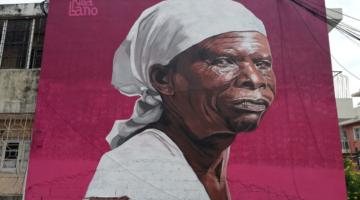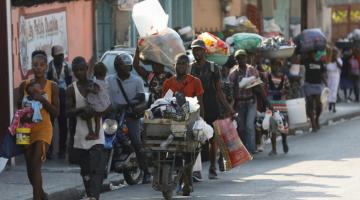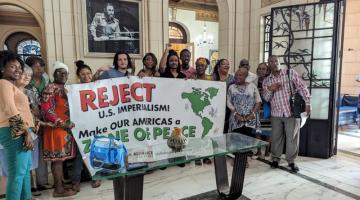Haitian migrants in Ciudad Acuña, Mexico in September 2021. PHOTO BY PAUL RATJE/AFP VIA GETTY IMAGES
Thousands of migrants are trapped at the border as the United States and Mexico crack down on deportations—under Biden’s policies, many will be expelled.
This article was originally published in In These Times.
MONTERREY, MEXICO —Wilson sits, constantly refreshing his phone, waiting for COMAR, the Mexican Commission for Refugee Assistance, to reschedule his appointment, originally set for Oct. 13, 2021. A day prior he received a cancellation through email. “I’m still waiting for the new date,” says Wilson, who asked not to use his full name for protection, with his gaze fixed on the phone.
The Casa Indi migrant shelter in Monterrey, in northeastern Mexico, received 1,600 Haitian migrants in September 2021, a month after a tropical storm damaged large swaths of the island and contributed to the destabilization that has forced tens of thousands of Haitians to flee. “At least 214 children arrived, less than 8 years old, 215 women, and about 10 pregnant women. Two children have already been born here. What about the human part?” asks José Jaime Salinas, Casa Indi’s accountant.
By early November, hundreds of refugees and asylum seekers, mostly Haitians who were sleeping on the floor under tents outside Casa Indi, are no longer here. Most Haitians who reached the U.S. border had previously attempted to settle in Brazil and Chile after Haiti’s devastating 2010 earthquake. They’ve been moving north as racism and anti-immigrant sentiment impacted their well-being. But it’s unlikely those who left made it to the United States as they had aspired. Under the Biden administration’s Title 42 policy (initiated by the Trump administration under the pretext of preventing the spread of Covid-19), thousands of Haitian migrants seeking asylum were simply expelled back to Haiti or southern Mexico. In addition to Title 42, the Biden administration is also restarting the Trump administration’s infamous Remain in Mexico program, whereby migrants must wait in Mexico until they are approved, and expanding it to include Haitians. So those seeking safety, like Wilson, remain in limbo, even as more refugees arrive.
These aggressive U.S. policies have deterred many Haitians from completing their journey north, but they face another set of hostile conditions in Mexico. The Mexican government has mirrored Biden administration policies by militarizing the country’s southern border, enforcing mass detention and deportation, and subjecting migrants to a grueling asylum process.
According to Yetzi Rosales Martínez, a researcher at El Colegio de la Frontera Norte in Monterrey, the chain reaction starts with the United States. “Historically, everything depends on the politics of U.S. immigration,” Martínez says. “When [the United States] needs population, it opens the borders. When it does not, it starts deporting.” With the growing militarization of Mexico’s borders, Haitians are trapped in cities like Monterrey, Nuevo León, where they form a “permanent” community under constant threat of deportation. Despite the continuous arrival of Honduran migrants who have been stranded for years, the state of Nuevo León hasn’t prepared to receive a large number of migrants and asylum-seekers, nor does it have the political will to do so.
The arrival of Haitian asylum seekers has generated a crisis of care. Advocates demand international protection for Haitians as well as urgent attention to the integration of Haitian migrants into social life. “They have to wait for an overburdened, under-resourced COMAR office to process their asylum claims in order to get permanent residence, in order to leave,” explains Nicole Phillips, legal director of Haitian Bridge Alliance (HBA), an advocacy group assisting Haitian migrants.
In 2021, 131,448 people sought refuge in Mexico, Andrés Ramírez, COMAR’s director, said on Twitter. Haitians outnumbered Hondurans — who used to make up the greatest portion of those seeking asylum — with the highest number of applicants for refugee status in Mexico at 51,857 claims. The children of Haitians, with Chilean and Brazilian nationalities, bring the number to 62,570. This record number surpasses the previous annual record in 2019 by 86.84%.
Wilson, 28, would be happy to build a life in Mexico with his 29-year-old wife and 2‑year-old son, but he is waiting on COMAR. “If I get [my papers], I can work,” he says. Migrants at Casa Indi have reported that some employers have offered them work without papers, but the conditions are exploitative, with mistreatment and little rest.
“There have been many stories of Haitians feeling like their claims are overlooked, or they are not being helped in the same way that others have been helped,” says Phillips. “It wasn’t until April of 2021 that COMAR finally hired creole translators. So for all of these years, the tens of thousands of Haitians… couldn’t really defend themselves or adequately seek asylum. These are instances of systematic racism, the low prioritization of the due process rights of Haitians.”
As racial discrimination is pervasive across Mexico, Black asylum seekers face unique challenges, such as unequal treatment, barriers to accessing services, and racialized violence, thus heightening the vulnerabilities of Haitian migrants. The racism that Afro-Mexicans and dark-skinned Mexicans face is also experienced by Haitian migrants in accessing employment, healthcare, education and housing. Mexico’s unwillingness to ramp up its asylum system has confined asylum seekers to shelters or nearby neighborhoods whose populations also face insecurity, economic hardships, and a lack of government support.
Moreover, as African and Caribbean migration to and through Mexico has increased in the past decade, human rights groups have documented instances of local police harassing and robbing Black migrants.
John Bayard, who made the dangerous journey from Chile to Mexico with his wife and 3‑year-old daughter, says he could only find overpriced rent in an insecure neighborhood — and the municipal police took a large amount of his savings. “[The local police] intimidate us, threaten us with planting drugs on us,” Bayard says. “Here, we have no rights.”
One of the main priorities should be the training of local authorities in the matter of human rights, because crime is linked to migration, explains psychologist and activist Katy Cavazos.
“The migrant’s profile is visualized, or the structure of the migrant person is that of a criminal person,” adds Cavazos, who has assisted migrants and refugees, mainly Central Americans, in their passage through the city for the past years.
There are no immigrant integration programs in the northern state, and the government hasn’t played a role in the economic and social integration of asylum seekers, leaving the migrant population vulnerable to exploitation and xenophobia. Migrants at the shelter have reported that, although they are grateful that some employers have offered them work without having to have papers, they feel the conditions are exploitative, with long working hours, little rest and mistreatment compared to Mexican workers.
“If all the migrants were white, we would not be seeing this,” says Cavazos. “In this classist and xenophobic state, it is difficult to make any concrete plans to assist the migrant population.
In addition to the urgency of speeding up asylum processes, the Haitian migrant population in Monterrey is in great need of language assistance, integration services, and free medical services. Casa Indi counts with a provisional health clinic, but the lack of interpreters and the little information available has deterred Haitian refugees from seeking assistance. Some, like Wilson, have sought medical help in private clinics near the shelter, but he’s either denied care or overcharged.
The long wait times in the asylum system and the obstacles in accessing jobs, that most of the times are precarious, increase the difficulties in accessing basic care. Enise Charles has had problems for months with an irregular menstrual cycle that sometimes makes it difficult to walk. She’s still waiting for a gynecologist. “I want to settle in a place to receive the proper treatment,” she says.
Charles, 25, who taught kindergarten in Haiti, left Chile with her boyfriend partly due to growing anti-Black and anti-immigrant discrimination. They arrived in the southern Mexican city of Tapachula, where tens of thousands of Haitians await the outcome of their asylum claims. A “roofless prison” is how a report by Amnesty International and advocacy group Haitian Bridge Alliance describes the situation.
In October, the Congress of Nuevo León requested the intervention of the Secretary of the Interior of Mexico, Adán Augusto López Hernández, to resolve the legal situation of thousands of migrants since institutions, both public and civil society, are overwhelmed. This will allow them to move more freely and look for jobs. However, shelters like Casa Indi are still waiting to hear from both the federal and the state governments.
Despite the apprehensions and massive expulsion of Haitians by the American and Mexican governments, the arrival of Haitians will continue. In September, Mexico’s migration forces registered 41,225 apprehensions, up from the previous high of 32,155 set in August. Since September, according to the International Organization for Migration, the United States has expelled 13,690 people in 128 flights.
“Title 42 is preventing Haitians from seeking asylum at the US-Mexico border. Whether Title 42 is in place or not, Haitians are still gonna come because they believe it is their only chance for security and stability,” says Phillips.
Some argue that the United States has a special responsibility to support Haitians. The United States has coerced market-oriented reforms and backed the violent 1991 and 2004 coups that overthrew democratically elected President Jean-Bertrand Aristide. That destabilization has contributed to Haiti’s present political crisis in the aftermath of President Jovenel Moïse’s July 2021 assassination. Now, the United States has inserted itself to support Ariel Henry as Haiti’s leader, despite being unelected. State Department Special Envoy to Haiti Daniel Foote resigned in September 2021 in protest of this “international puppeteering.”
According to Phillips, Haitian Bridge Alliance is expecting “tens of thousands of more Haitians to flee Haiti.” Instead of “putting up walls and criminalizing them,” Phillips adds, “the Americas and clearly the U.S. need to prepare for how we can welcome the Haitian migrant community.”
Chantal Flores is a freelance journalist in Mexico City. She is currently working on her first book, focused on the parents of Mexico’s disappeared. Her writing has appeared at Vice, Rolling Stone Mexico and Upworthy.



















